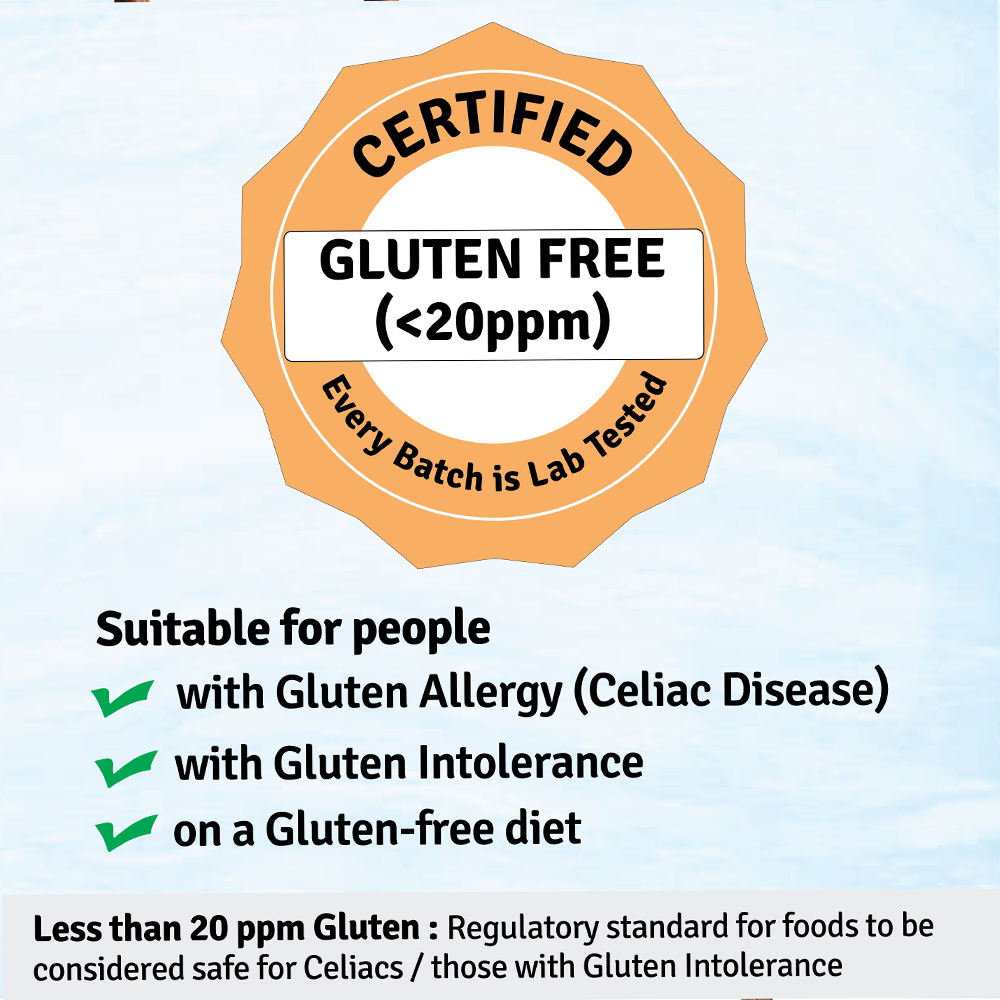How Gluten Allergies Affect Your Overall Health and Well-Being?
(5 min read)
Aug 10, 2024
Gluten, a protein commonly found in wheat, barley, and rye, is now recognized as a major player in brain function and mental health, especially for those with celiac disease or gluten sensitivity. Though known for causing digestive problems, its influence on mental well-being is receiving more attention. In this blog, we'll uncover how gluten affects mental health, exploring both its physical and psychological impacts. By digging into these areas, we'll gain insight into the complex connection between gluten intake and mental well-being.
Physical effects of gluten:
1. Inflammation:
In individuals with celiac disease or non-celiac gluten sensitivity, ingestion of gluten can trigger an immune response that leads to inflammation. This inflammation can extend beyond the gut and affect the brain, contributing to neuroinflammation. Chronic neuroinflammation is associated with a range of neurological and psychiatric conditions, such as depression, anxiety, and cognitive decline.
2. Psychiatric or behavioural issues:
Mood disorders: Gluten can cause mood disorders, especially in individuals with celiac disease or non-celiac gluten sensitivity. In celiac disease, gluten triggers an autoimmune response that damages the small intestine, leading to malabsorption of nutrients essential for brain function. This condition also causes inflammation, affecting neurotransmitter levels and the gut-brain axis. Gluten can produce peptides with opioid-like effects, disrupting brain function. Many report mood improvements on a gluten-free diet, and studies show higher rates of mood disorders in those with untreated celiac disease, highlighting gluten's impact on mental health.
Foggy brain: Gluten can cause brain fog, through several mechanisms. The immune response to gluten can trigger inflammation and release pro-inflammatory cytokines that affect brain function. Additionally, gluten-induced damage to the small intestine can lead to nutrient deficiencies essential for cognitive function. Disruption of the gut-brain axis and altered gut microbiota due to gluten can further impair cognitive clarity. Many people with gluten sensitivity report significant improvement in brain fog after adopting a gluten-free diet, suggesting a strong link between gluten and cognitive symptoms.
Cognitive and memory problems: Gluten can cause memory problems, through inflammation and nutrient deficiencies. The immune response to gluten triggers inflammation and the release of pro-inflammatory cytokines, which can affect brain function and memory. Damage to the small intestine from gluten intake leads to malabsorption of essential nutrients like B vitamins, critical for cognitive health. Additionally, disruption of the gut-brain axis and changes in gut microbiota can negatively impact memory. Many people report improved memory after adopting a gluten-free diet, highlighting gluten's role in cognitive impairments.
Studies suggest potential connections between gluten and: Anxiety disorders, Attention deficit hyperactivity disorder (ADHD), Depressive and mood disorders and Schizophrenia.
Psychological effects of gluten-related disorders:
Dealing with an autoimmune disease or making major dietary changes can cause stress and difficulty in managing emotions. Managing autoimmune diseases like celiac disease or adopting a gluten-free diet can induce significant stress and emotional challenges. The diagnosis brings uncertainty about lifelong dietary restrictions and concerns about health management, leading to anxiety and distress. Vigilance in adhering to a gluten-free diet, including reading labels and navigating social situations, can result in feelings of isolation and frustration. Nutritional concerns further compound the emotional burden, as individuals must ensure dietary adequacy while adjusting to new eating habits. The emotional toll of coping with these challenges may contribute to depression and anxiety, emphasizing the importance of education, support networks, and professional guidance in managing both the physical and emotional aspects of the condition.
What the research shows:
- Research on the link between gluten and mental health is ongoing, but some studies show promise:
- A study linked anxiety to gluten sensitivity and showed a gluten-free diet reduced anxiety in celiac patients.
- Another review found a gluten-free diet improved mental health in patients with celiac disease or gluten sensitivity, but adherence to the diet was crucial.
Studies on ADHD and schizophrenia suggest that for some people, a gluten-free diet may improve symptoms, especially if they have underlying celiac disease.
Important considerations:
While adopting a gluten-free diet may have potential benefits for mental health in certain individuals, it's essential to recognize that it should not serve as a substitute for traditional mental health treatments such as therapy or medication. Mental health conditions require comprehensive management, often involving therapy, medication, or a combination of both, tailored to individual needs. If there is a suspicion of a gluten connection to mental health issues, it's crucial to have an open and informed discussion with a healthcare provider. Before making any dietary changes, it's essential to undergo proper diagnosis and testing for conditions like celiac disease or gluten sensitivity. This ensures that any dietary adjustments are based on accurate information and made under medical supervision. Changing your diet without proper diagnosis and guidance can lead to unintended consequences and may not address the underlying issue effectively. Therefore, consulting with a healthcare professional is essential to ensure a holistic approach to mental health management.
Living with a gluten-related disorder:
In summary, understanding the complex relationship between gluten and mental health underscores the importance of comprehensive management strategies. While adopting a gluten-free diet may offer potential benefits for mental well-being, it should not be viewed as a standalone solution. Traditional mental health treatments such as therapy and medication play crucial roles in managing conditions like depression, anxiety, and cognitive decline. Therefore, individuals should approach dietary changes with caution and seek proper diagnosis and guidance from healthcare
professionals. By taking a holistic approach to mental health management, incorporating both dietary modifications and traditional treatments, individuals can optimize their well-being and quality of life.
Try our Gluten Free Atta!
Lab certified with 20ppm Gluten
Checkout more blogs!
How Gluten Allergies Affect Your Overall Health and Well-Being?
Gluten, a protein commonly found in wheat, barley, and rye, is now recognized as a major player in brain function...
Top 10 Foods to Avoid If You’re Gluten Intolerant
Navigating a gluten-free diet can be tricky, especially since gluten lurks in many unexpected places. If you're gluten intolerant, it’s...
Managing Cross-Contamination Risks for Celiac Disease and Gluten Intolerance
For individuals with Celiac disease or Gluten intolerance, avoiding gluten is not just a dietary choice but a critical health...











